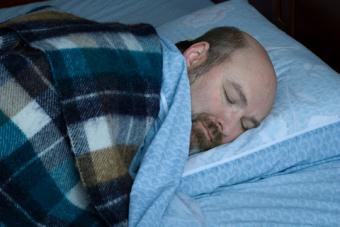
Seroquel is the brand name for quetiapine fumarate, and while some physicians prescribe it for sleep problems, it's not intended for this use. The Food and Drug Administration (FDA) licenses this medication to treat severe mental illnesses such as schizophrenia and bipolar disorder. Before you begin taking this medication for insomnia, understand what the medication's appropriate use is.
The Appropriate Use of Seroquel
Conventional antipsychotics treated schizophrenia and schizophrenia-like symptoms in the 1950s. In the 1990s, atypical antipsychotics were developed to help individuals who didn't find relief with its predecessors. Over time, the medication helped individuals not only suffering from schizophrenia, but also those who experienced periods of mania and depression, otherwise known as bipolar disorder. The medication helped calm the manic episodes and decrease depression symptoms.
One of the side effects physicians noticed was that patients taking Seroquel had to take it before bedtime because it made them so drowsy that they needed to sleep.
Treatment for Mental Illness or Sleep Disorder?
Since mental disorder symptoms often include the inability to sleep, some physicians have turned to Seroquel to treat individuals who are resistant to mental health treatment. Instead of telling patients that they have a mental health diagnosis and risk treatment non-compliance, they tell them that they have a sleep disorder, which is more socially acceptable. Therefore, they are able to treat the patient for his mental illness masked by his need for a sleep aid.
Reasons for FDA's Disapproval of Seroquel as a Sleep Aid
Seroquel is an antipsychotic. The FDA approves it for treating schizophrenia and bipolar disorder. It has many side effects and some have severe health effects such as:
- Neuroleptic malignant syndrome (NMS)
- High blood sugar (hyperglycemia) - Coma or death can result if levels become too high.
- High cholesterol and triglyceride levels - This increases your risk for heart attack and stroke.
- High cholesterol and triglyceride levels - This elevates the risk for heart attack and stroke.
- Weight gain
- Tardive dyskinesia
- Orthostatic hypotension
- High blood pressure in children and teens
- Decrease in white blood cell count
- Cataracts
- Seizures
- Abnormal thyroid tests
- Higher prolactin levels
- Increased liver enzymes
- Painful and long lasting erections
- Difficulty in swallowing
User Reports of Sleep Issues Resolved with Seroquel
Despite the warnings from the FDA about the medication, many physicians continue to prescribe the medication to patients with insomnia. Mental Health Daily notes that it is a risky treatment and most appropriate for patients suffering from schizophrenia with comorbid insomnia.
Deciding on Seroquel for Sleep
Some physicians won't prescribe medications for issues other than what they are approved for by the FDA. If you do find a physician who will prescribe Seroquel for sleep issues, consider the side effects before you fill your prescription. Due to the serious health effects, it would be best to reserve this medication for it's true treatment recommendation, serious mental illness.







